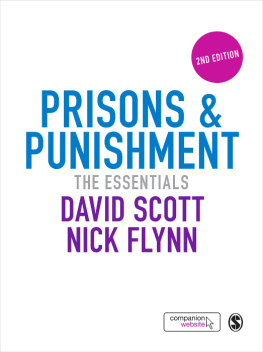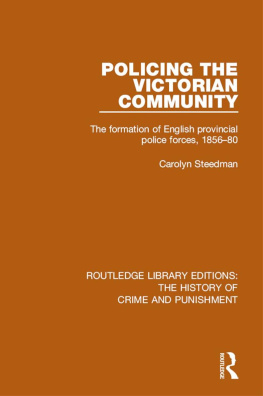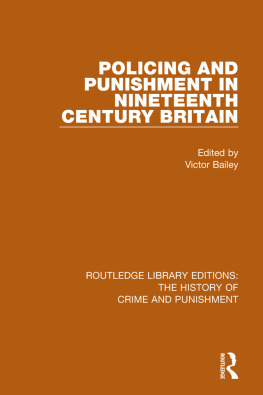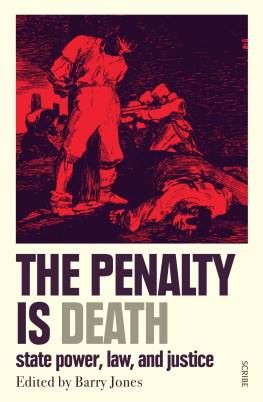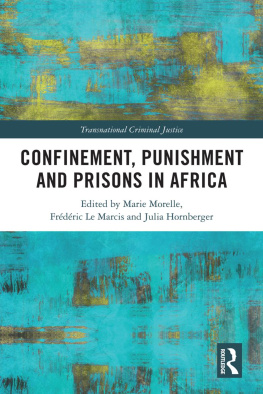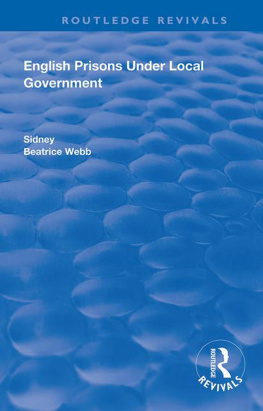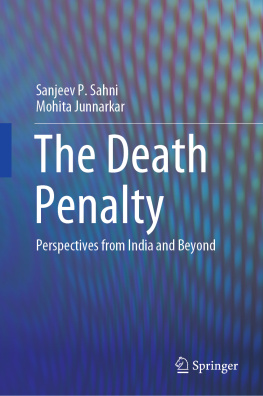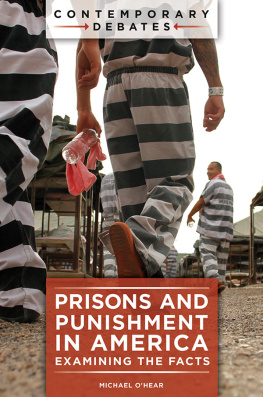ENGLISH LOCAL PRISONS
18601900
It is a major contribution. McConvilles study of English local prisons in the last four decades of the nineteenth century combines probing and impeccable scholarship with a crisp and sprightly style; his work will live as one of the great and lasting studies of the history of criminal justice.
Norval Morris, The Law School, University of Chicago
The local prisons of the latter half of the nineteenth century refined systems of punishment so harsh that one judge considered the maximum sentence of two years local imprisonment to be the most severe punishment known to English law: next only to death. The punishment inflicted on prisoners was sometimes carried beyond the limits of health and sanity. Why was this policy adopted? Who conceived it? What was it like to endure?
This work examines how private perceptions and concerns became public policy. It also traces the move in English government from the rural and aristocratic to the urban and more democratic. It follows the rise of the powerful elite of the higher civil service, describes some of the forces that attempted to oppose it, and provides a window through which to view the process of state formation.
Next only to the workhouse and the school, local prisons were probably the most widely experienced civil institution of the times, yet by a curious oversight this is the first scholarly study of this formative period. The book is based on exhaustive archive research, and offers a new and original account of a most important episode in English social, legal and administrative history.
Sen McConville is Professorial Research Fellow in the Department of Law of Queen Mary and Westfield College, University of London. His previous publications include A History of English Prison Administration: 17501877, Routledge, 1981.
ALREADY PUBLISHED
A History of English Prison Administration, Volume I: 17501877
Sen McConville
First published 1995
by Routledge
2 Park Square, Milton Park, Abingdon, Oxon, OX14 4RN
Simultaneously published in the USA and Canada
by Routledge
270 Madison Ave, New York NY 10016
Transferred to Digital Printing 2008
1995 Sen McConville
Typeset in Garamond by Solidus (Bristol) Limited
All rights reserved. No part of this book may be reprinted or
reproduced or utilized in any form or by any electronic,
mechanical, or other means, now known or hereafter
invented, including photocopying and recording, or in any
information storage or retrieval system, without permission in
writing from the publishers.
British Library Cataloguing in Publication Data
A catalogue record for this book is available from the British Library
Library of Congress Cataloging in Publication Data
A catalogue record for this book has been requested
ISBN 0415032954
Publishers Note
The publisher has gone to great lengths to ensure the quality of this reprint
but points out that some
imperfections in the original may be apparent.
In the dozen years during which this volume has been in preparation several foundations and agencies have provided essential financial support. I acknowledge this assistance, with much gratitude. A three-year Home Office grant launched the project, and permitted the employment of a research officer, and, from time to time, other assistants, as well as travel to archives and specialist collections. This grant also helped with typing, microfilming and photocopying. The project officer was Mr Roy Walmsley, who interceded when the study acquired proportions not initially contemplated. His professionalism, informality and constant helpfulness have been much valued.
Not long after commencing the work, my career took me to the United States, where several agencies and foundations provided continuity in support. The National Endowment for the Humanities made two grants to help with visits to archives and specialist collections; the American Philosophical Society and the American Bar Foundation provided similar awards at other points. Without this assistance the difficulties of transatlantic archive and library research would have been much greater.
In the middle and concluding phases of the research I received substantial funding from the Harry Frank Guggenheim Foundation which, together with a Senior Fellowship at the University of Illinois at Chicagos Institute for the Humanities, allowed me to write uninterruptedly and to conduct further research. I wish to record my indebtedness during this period, and later, to Professor Gene Ruoff, and to Ms Linda Vavra, both of whom made the Institute a place of support and encouragement for scholars. The University of Illinois elected me a University Scholar for three years, and I drew much encouragement from this token of esteem, and am grateful for the funds which the award put at my disposal.
For a time after my move to the United States it was necessary to suspend work on this volume, and I was particularly heartened therefore to be elected to the Beto Chair at Sam Houston University, Huntsville, Texas. In return for minimal obligations, the College of Criminal Justice provided financial and secretarial assistance which enabled me to regain momentum in the research, and to complete drafts of three chapters. Colleagues at the College showed me that combination of hospitality and friendliness for which Texas is so rightly renowned. During this time I made the acquaintance of Professor George Beto, with whom I had many informative conversations.
I am indebted to a number of individuals for their support and encouragement, but none more than Professor Norval Morris of the University of Chicago Law School. His generosity and backing were constantly helpful, and I greatly value his friendship and continued interest and advice. Scholars throughout the United States, and in many other parts of the world, owe similar debts of affectionate gratitude to Norval Morris, and I am happy to be among that considerable number. Professor David Rothman of Columbia University has also been of great assistance, responding with unfailing kindness to my time-consuming requests. At two key junctures Professor David Fogel gave important assistance, and promoted my work. Dr Roger Hood, who has been familiar with this research from its earliest days, continued to advise, exhort and encourage. I am most grateful for all his acts of kindness over the many years of our friendship.
Apart from the initial phase of the research, I have worked alone, but wish to record my sincere thanks to several people who helped to get the project under way always a difficult stage. Mr Robert Sang, Mr Nigel Newcomen and Mr William Meyer served for successive periods as research officers, and Dr Loraine Geisthorpe and Ms Jane Draper supported as part-time research assistants. All undertook tedious but essential work with a conscientiousness and cheerfulness which I still recall with gratitude. Every word of the first draft of this volume was typed by Ms Odessa Johnson, my valued secretary at the University of Illinois at Chicago. I benefited greatly from her loyalty, energy and competence.


